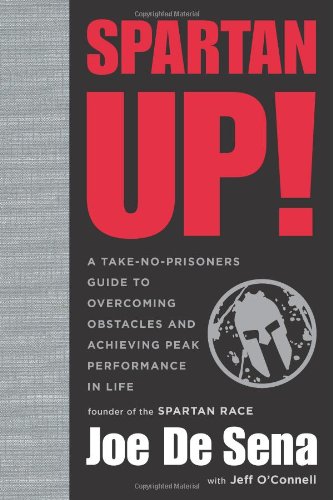 Before I went on vacation I read two very different books about athletic achievement. One was What I Talk About When I Talk About Running by Haruki Murakami, and the other was Spartan Up! by Joe De Sena. Murakami is a fiction writer I greatly enjoy. De Sena is an investment banker who retired from that and started Spartan Races, a type of obstacle racing.
Before I went on vacation I read two very different books about athletic achievement. One was What I Talk About When I Talk About Running by Haruki Murakami, and the other was Spartan Up! by Joe De Sena. Murakami is a fiction writer I greatly enjoy. De Sena is an investment banker who retired from that and started Spartan Races, a type of obstacle racing.
In many ways it’s unfair to compare them. They were written for different purposes and different audiences. Sena has a life philosophy that he wants to share. Murakami is writing about his own experiences with running, what they mean to him, and how their meaning has changed over the years, as he gained more experience and aged.
Murakami’s book reads more true to me because it’s one person’s experience, rather than espousing a life philosophy for everyone. By showing an individual experience, it implies the universal, while De Sena’s explicitly states a universal, which is everyone should work really hard and push themselves to their limits as much as possible. Every decision in every day should be weighed against whether it will make you better.
I mistrust life philosophies that purport to be universal, and I especially mistrust De Sena’s, for a few reasons. De Sena’s has no balance. If you are an overachiever, it’s easy to believe that every moment you must push yourself to do better (and if you don’t, you’re a failure), but that sort of thinking is incredibly damaging. I kept reading this book and thinking “yes, but”.
Yes, there is a value in pushing one’s self to the limits. I have learned a lot about myself by pushing myself to my physical limits, and discovering the mental limits that are there as well. We live in an insulating world here in the affluent west, and unless we seek out challenging experiences they don’t come to our door. But one of the things I’ve learned from pushing myself that hard is that it is damaging to do it too often.
Yes, physical strength and preparedness are great tools for letting me feel confident, prevent injuries (although they cause others), and improving my health. But it feels fascist to insist on it for everyone. Exercise and physical health are not moral goods. I believe they are goods in other ways, but I don’t believe that people have a moral obligation always to make the healthiest choices.
 Yes, you can always make the choice to run the ultra marathon, take the 24 hour bike ride, but you, Joe De Sena, have a wife who can take care of your 4 children while you exhaust yourself. Sometimes the hard work is not pushing yourself to your physical limits, but doing the day to day tasks. Okay, that got a little personal, but I couldn’t help but think that his wife is doing a lot of unsung work.
Yes, you can always make the choice to run the ultra marathon, take the 24 hour bike ride, but you, Joe De Sena, have a wife who can take care of your 4 children while you exhaust yourself. Sometimes the hard work is not pushing yourself to your physical limits, but doing the day to day tasks. Okay, that got a little personal, but I couldn’t help but think that his wife is doing a lot of unsung work.
Spartan Up! pushed up against my hard won philosophy for life which is: “Everything that is really worth doing is hard, but not everything hard is worth doing.” That said, it is a motivating book, and everyone needs an engagingly written kick in the ass sometimes, and this book is that. It’s just a bit one-sided.
By contrast, Murakami’s book is a personal exploration of what running has meant for him. He talks about how it affects his writing, and the similarities to his writing. He talks about the meaning of winning (or not), and the inevitable slowness he’s found with age. When you can no longer keep setting personal bests what does the pursuit mean? He doesn’t have universal answers. He barely has answers for himself. He only has observations. He has moments of delight. He has moments of pain and discomfort.
Pursuing athletic achievement has shown me humans’ ability to accomplish remarkable feats, but it has also shown me how very fragile we are. Becoming stronger is walking a fine line between injury and growth. The two hundred pound stone I pick up, and feel mastery of, can crush my finger. We are strong and we are weak. Murakami’s book explores both sides of that. De Sena’s tries to ignore the weakness, but I think that a philosophy that does not embrace both sides is missing something.
2 Comments
There is great and hard won wisdom in your “Everything that is really worth doing is hard, but not everything hard is worth doing.” You also articulated for me a number of the issues connected with those author/advocates who are pushing an agenda. There is no “self-made man” for interdependence is inherent in existence.
Thanks Dad! I’m glad you enjoyed this post.